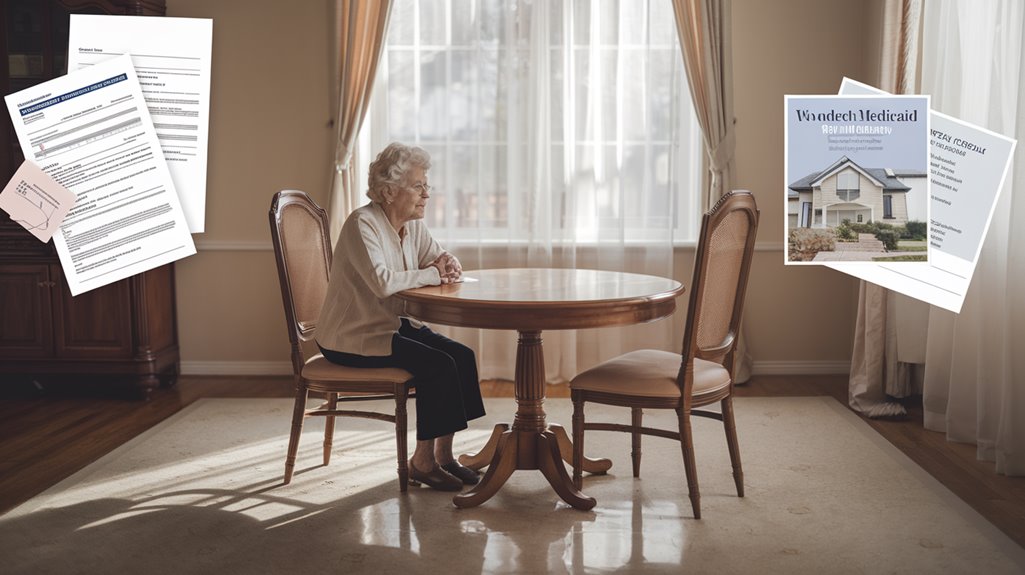Selling a home while having a spouse in a nursing home creates complex emotional and financial challenges. Many couples face this difficult situation when one partner requires long-term care.
You must consider various factors like property rights, healthcare costs, and ongoing living arrangements. This decision becomes more stressful when you factor in Medicaid eligibility rules and asset limits.
You might worry about maintaining financial stability while ensuring quality care. The process can feel overwhelming without proper guidance and support. Yes, you can sell your house if your spouse is in a nursing home, but you need proper legal consent and guidance.
This guide will walk you through the essential steps, legal requirements, and financial considerations for selling your home. This comprehensive guide will explain how to navigate this challenging situation while protecting both spouses’ interests.
Key Takeaways
- Selling a house is legal if a spouse is in a nursing home, with required consent or power of attorney.
- Review the home’s ownership structure, such as joint tenancy, to understand selling rights and requirements.
- Essential legal documents include a power of attorney, quitclaim deed, and title deed for property transfer.
- Timing of sale is crucial to avoid affecting Medicaid eligibility and maintain nursing home benefits.
- Consulting professionals like elder law attorneys and Medicaid specialists is advised for legal and financial guidance.
Understanding Spousal Rights and Property Ownership

Spousal property rights change when one partner moves into a nursing home. You should review your home’s ownership structure before making any property decisions. Joint tenancy and tenancy by the entirety affect your selling rights differently. Your spouse’s mental capacity determines if you need additional legal documents. If your spouse cannot make decisions, you must obtain a power of attorney.
This legal document lets you act on behalf of your spouse. We recommend working with a real estate attorney for proper guidance. A lawyer will help protect both spouses’ interests during property transfers. You can avoid legal issues by following proper documentation procedures. Since nursing home care involves complex regulations, proper legal support becomes essential. The sale process must follow state-specific property laws and regulations.
Can You Legally Sell Your House When Your Spouse Is in a Nursing Home?

You can legally sell a house when your spouse lives in a nursing home. Legal consent from your spouse or their representative is necessary for the sale. If your spouse cannot make decisions, you will need proper legal authority to proceed. A power of attorney document helps you make financial decisions on behalf of your spouse. This legal step protects both parties during the property sale process.
We recommend speaking with an elder law attorney before starting the sale. The attorney will explain state laws about property rights and nursing home residents. You should understand the impact of the sale on Medicaid benefits. While the process may seem complex, proper guidance makes it manageable. If you follow legal requirements, the sale can proceed smoothly.
How Does Medicaid Impact Your Decision to Sell?

Medicaid eligibility can change significantly when you sell your home during nursing home care. You must carefully time the sale of your home to protect Medicaid benefits. The sale will turn your exempt home asset into countable cash resources. If you sell before getting Medicaid approval, your spouse might lose their benefits. This situation becomes more complex when both spouses own the house together.
Since joint ownership affects asset limits, you should plan the sale strategically. So, we recommend waiting until after Medicaid approval to sell your property. When you follow proper timing, your spouse can keep their benefits intact. You should consult a Medicaid specialist before making any decisions. If proper planning isn’t done, your spouse could face benefit disqualification. The proceeds from your home sale must stay within Medicaid’s asset limits.
What Legal Documents Do You Need Before Selling?

Legal Documents Required Before Selling Your House You must gather essential legal documents before selling your house. Essential paperwork helps protect both the seller and buyer during a property sale.
A Quitclaim Deed transfers ownership rights when multiple names appear on the property deed. If your spouse lives in a nursing home, their consent becomes vital for the sale.
You should obtain a Power of Attorney to handle property transactions on behalf of others. This document proves your legal authority to make decisions about the property.
The Title Deed confirms your legitimate ownership of the property for potential buyers. When dealing with joint ownership, Joint Tenancy Agreements outline specific rights and responsibilities.
If your spouse resides in a nursing facility, you will need additional documentation. Their written consent or approval from a legal representative ensures a smooth transaction.
Should You Consult an Elder Law Attorney?

You should consider consulting an elder law attorney when selling your home with a nursing home spouse. This decision requires expert guidance to protect your assets and understand Medicaid rules. You can benefit from professional advice about timing the home sale correctly. These attorneys understand complex rules about asset transfers and Medicaid eligibility.
If you work with an expert, you will avoid costly mistakes during the sale process. When legal professionals review your case, they can suggest ways to protect your finances. Your attorney will help safeguard assets for the spouse living at home.
So, specialized attorneys can guide you through spousal protection rules and asset limits. While the process seems complex, professional help makes it more manageable. Since timing matters greatly, early consultation with an attorney prevents future problems. If you seek help early, you will have more options to protect your financial interests.
What Are the Financial Implications of Selling?
Financial Implications of Selling Your Home: You must understand the money-related effects of selling your home during nursing home care. An elder law attorney can explain these complex matters clearly:
- Asset Conversion: Your home sale turns protected assets into cash that Medicaid counts.
- Asset Limits: You must manage the sale money carefully to keep nursing home benefits.
- Community Spouse Resource Allowance: The law lets you keep up to $130,380.
- Quitclaim Deed: This legal document will give you full control of the property.
- Timing of Sale: If you sell before getting Medicaid approval, it could affect your benefits.
We recommend working with experts to protect your interests. This step ensures you follow all Medicaid rules correctly. You should plan each step with your attorney’s guidance. If you time the sale well, you can maintain your spouse’s benefits. So, consider all these factors before making your final decision.
How to Protect Your Spouse’s Future Care Needs
Protecting your spouse’s future care requires smart decisions about your family home and assets. You need to understand how selling your home affects Medicaid eligibility. The house remains exempt from Medicaid calculations while you live there.
If you sell the house, the money could count against Medicaid limits. This situation might put your spouse’s nursing home care at risk. You should talk to an elder law attorney about asset protection strategies.
We recommend setting up an irrevocable trust to protect your assets. This trust can shield your money from nursing home expenses. When your spouse enters a nursing home, you can declare intent to return home.
This declaration helps keep your house exempt from Medicaid calculations. Since laws vary by state, professional guidance ensures the best protection. If you plan ahead, your spouse will have secure access to needed care. The timing of property transfers matters for Medicaid qualification.
Is Selling Your House for Cash a Good Option?
You can get quick money by selling your house to cash buyers. This option works well when you need funds fast for nursing home costs. Cash buyers will complete the purchase within days, not months.
If you choose this path, you should know both its benefits and drawbacks:
- Quick Access: You will receive your payment right after closing.
- Simple Steps: You won’t need to make repairs or host open houses.
- Medicaid Impact: Your cash proceeds might affect your benefits.
- Legal Support: We recommend talking to an elder law expert.
- Money Planning: You must manage your new funds wisely.
So, this choice depends on your specific situation and needs. While cash sales offer speed, they might bring lower prices. Hence, you should compare all options before deciding. When in doubt, seek advice from financial experts. This way, you can protect your interests and make smart choices.
The final decision should match your financial goals and timeline. You can benefit from cash sales if speed matters more than price. Since this affects your future, take time to review all aspects carefully.
What Are the Benefits of Selling As-Is to a Cash Buyer?
Selling as-is to cash buyers offers several key benefits for homeowners. You can skip repairs and renovations that regular buyers often demand. The closing process moves quickly, usually taking only 7 to 14 days. We see many sellers save money since they don’t need home staging or marketing. If you work with cash buyers, your deal has fewer chances of falling through.
These investors understand properties in any condition. This method works well for people who need quick access to funds. So the entire process brings less stress during difficult situations. When you choose cash buyers, they handle most paperwork details. If your house needs major repairs, cash buyers will still make fair offers.
How to Prepare Your House for a Quick Sale
A quick house sale requires specific preparation steps to attract potential buyers and secure good offers. You must start with essential repairs to fix any visible damage in your home. We recommend a thorough cleaning of all rooms, including windows and carpets. This step will make your house shine.
A well-staged home helps buyers envision themselves living in the space. You should remove personal items and arrange furniture to showcase each room’s potential. If you stage your home correctly, it will appeal to more buyers.
The right price can make or break your sale prospects. You need to research recent sales of similar properties nearby. When you price your home competitively, buyers will show more interest.
Property documents play a crucial role in smooth transactions. We suggest organizing all maintenance records, tax papers, and legal documents. If buyers request information, you can provide it immediately.
Professional real estate agents bring valuable expertise to the selling process. You should choose an agent who knows your local market well. So, if you work with the right expert, your sale process will move faster.
These strategies will position your property effectively in the market. Your chances of a quick sale increase when you implement all these steps systematically.
Need a Stress-Free Solution? Sell Your House to Greg Buys Houses
This process requires careful planning when your spouse lives in a nursing home. You need proper legal authority and documentation to proceed with the sale. Since Medicaid rules affect property sales, consulting an elder law attorney is essential.
We purchase homes across multiple areas:
- We buy houses in Escambia
- We buy houses in Pensacola
- We buy houses in Santa Rosa
- We buy houses in Okaloosa
- We buy houses in Bay County
We at Greg Buys Houses understand your unique situation and offer quick closings. You can trust our team to handle your home sale with care and respect. We will make a fair offer within 24 hours if you need a reliable cash buyer. So call us today at (850) 979-0031 to discuss your property sale.

